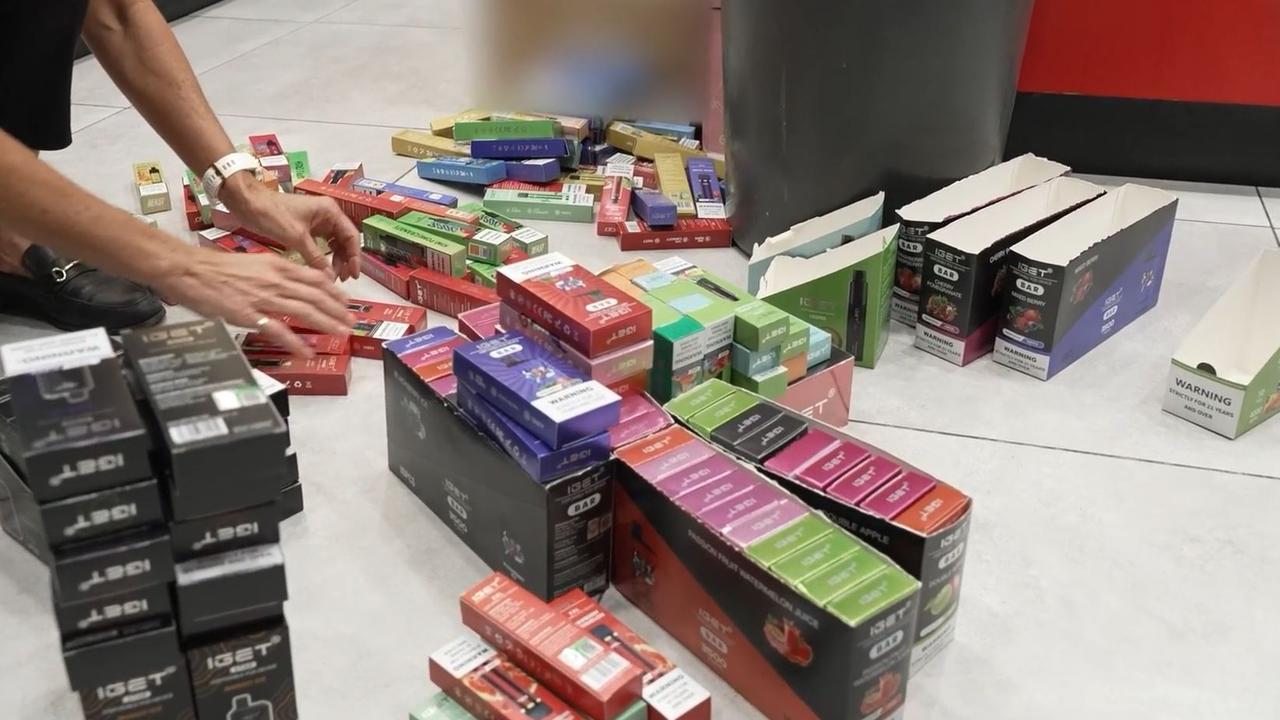FIFA Women’s World Cup: The Matildas empower the next generation of female players
For Sydney player Sarah Hunter, the tournament will be remembered as one of the most significant moments in world sporting history.

NSW
Don't miss out on the headlines from NSW. Followed categories will be added to My News.
Sarah Hunter, rising football star (that word can refer to other codes but we’re claiming it for soccer just now) believes the FIFA Women’s World Cup 2023, kicking off in Auckland and ending at Sydney Olympic Stadium on August 20, will be remembered as one of the most significant moments in world sporting history.
“It’s going to be one of the most important times, looking back, for the whole world,” she says.
Hunter went to school at Pymble Ladies’ College and played junior football at Northbridge Football Club. She is in the Future Matildas program, Football Australia’s power engine nurturing the next generation of Matildas, which has seen 10 players graduate into the senior squad in the past two years.
“Soccer is 100 per cent the biggest sport in the world – maybe not in Australia until now – but in the rest of the world,” she says.
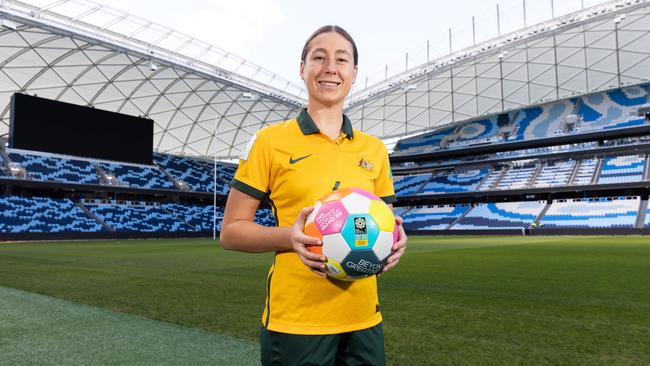
For the first time, the FIFA Women’s World Cup will be held in the southern hemisphere, co-hosted by Australia and New Zealand.
There’s been a radical change in perception of the game here, where it was once seen as an immigrant artefact. And now, Australia’s rapid growth in enthusiasm for its female players is mirroring a bigger worldwide trend.
It will be the biggest and most attended FIFA Women’s World Cup in history and the first time the Cup has fielded so many teams – 32 in all. And in the future, the number of teams at such events is expected to grow even more.
Sarai Bareman, FIFA’s chief women’s football officer, explains: “Our goal with the FIFA Women’s World Cup 2023 is to showcase the immense talent of women’s football and create a global platform that celebrates the game. We aim to inspire and empower the next generation of players, fans, and leaders, driving the growth and development of women’s football worldwide.”
Bareman, a Samoan-born New Zealand footballer who has had an extraordinary career and became a mother last year, says FIFA is committed to delivering an exceptional tournament.
“We are so ready to go Beyond Greatness,” she says.
Hunter reflects on this goal and shares her interpretation of it.
“Looking back over history, females haven’t had the platform to play sport, let alone in big stadiums. There have been female pioneers in sport that have laid the foundations. But this new generation coming through has had the chance to experience football in a new way and that has created an opportunity for an exponential rise in interest.
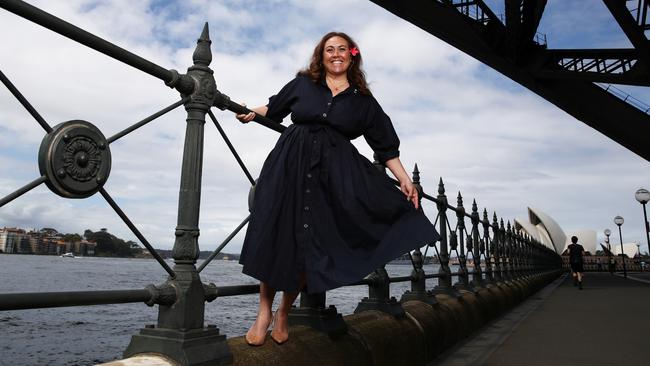
“Looking at games these days, the quality is so much better than it used to be.
“So there’s that these girls are special. They’ve got something. Like Sam Kerr – whether she’s female or male, who doesn’t want to watch her? She’s got star power and that’s what people want to watch.”
Like Bareman, who has crossed the world with her football career and now lives in Zurich, Hunter says that what the sport is giving her is extraordinary.
“I’ve been all around the world for this sport and met so many people, so that’s really appealing – there are so many opportunities worldwide,” she says.
“You can talk to anyone from around the world and they’ll know football, it’s so universal. And I find it an art form. Most people can catch a ball with their hands but football is with your feet and I think it’s a combination of so many skills,and it’s quite beautiful to watch.
“From a young age I’ve always played football, and I’ve played lots of other sports as well, so I can compare. It’s not just about physicality. It’s not entirely physical – you could say this about every sport – but it’s a lot to do with tactics, the mental and the smarts.”
The Future Matildas aren’t just future leaders. They’re already leaders in their own right.
Hunter was a key part of the Sydney Football Club team that won the Women’s A-League premiership and championship. She was recently named the A-League Women’s Young Footballer of the Year – an award previously won by talents the likes of Steph Catley, Ellie Carpenter, Elise Kellond-Knight, Kyah Simon and Kyra Cooney-Cross.
She was part of the FIFA Under 20s Women’s World Cup team 2022 and captained the side against Spain in the final group match.
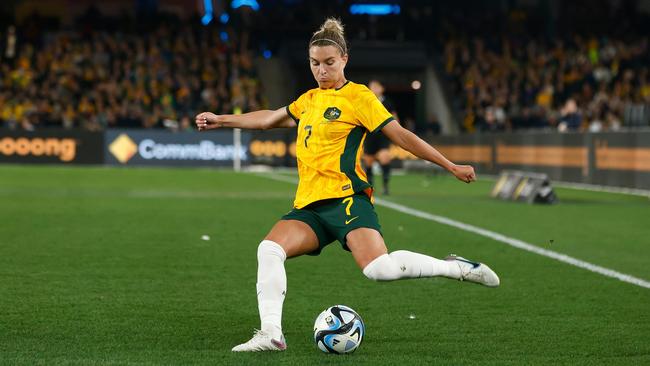
“Speaking to so many young girls now, they’ve got role models that are female,” Hunter says.
And she is one of them.
“When we had our grand final here at the Sydney Football Stadium (Moore Park), the stands were full of young girls. So I think that’s why the exponential growth will continue – everyone knows a young girl, whether it’s your daughter or your sister.
“When you have someone you love that is really interested in something, you want that to grow.”
Hunter recently met up with sisters Jynaya and Indiana Dos Santos, of the Young Matildas, at the Sydney Football Stadium.
Like Hunter, Jynaya is unsurprised by the surging popularity of football for women.
“I knew it was coming. It’s a crazy game. You could see it started overseas at first. They’d get record crowds and I just kind of knew that it would be coming here.”
One of four sisters, she started playing when she was about five.
“My dad got us into it. Because we’re all girls, everyone would say ‘oh, put them into netball’ but my dad was like, ‘no, let’s just try soccer’. And I just fell in love with the game.
“It’s really exciting to see the world’s greatest players come to our doorstep. We’ve been watching them on our TV since we were little, so to see them live is pretty amazing.
“It inspires a lot because you can see what you can achieve and in four years’ time, hopefully the next World Cup, we’ll be playing in it.”
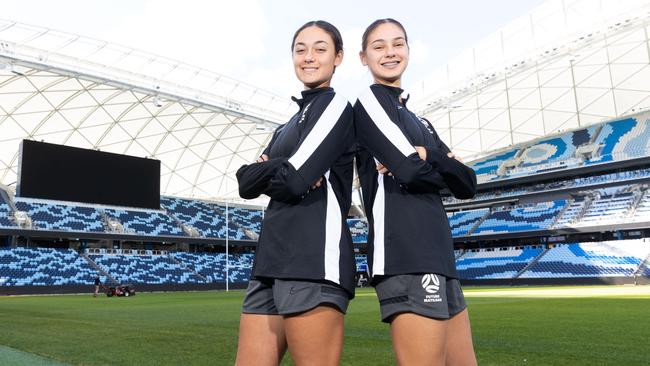
Indiana, her two years younger sister, is also thrilled by what the FIFA Women’s World Cup 2023 will do for football.
“I think it’s really cool because it’s going to build women’s football so much, not only inspiring young girls to play soccer but also the supporters around it. It’s great to see how it’s going to build the fans and people coming to watch our games.
“When we were little and playing, it would just be like boys’ teams and we’d have to join in and be the only girls. So to see girls’ teams now is like: ‘Wow! Is that really happening?’”
There’s something else happening as well. Hunter is also a football coach, coaching an U11 boys’ team. Young boys, mad about football, like my grandsons Maximo, 7, and Matteo, 4, don’t notice gender. Instead, they see classy players who they want to emulate.
On June 25, the day the Harbour Bridge closed while FIFA Women’s World Cup’s Unity Celebration took it over, Max and Teo joined in the festivities, wearing their Socceroos supporters’ jerseys and carrying their local club’s Player of the Week trophies,which, coincidentally, they had both won the day before.
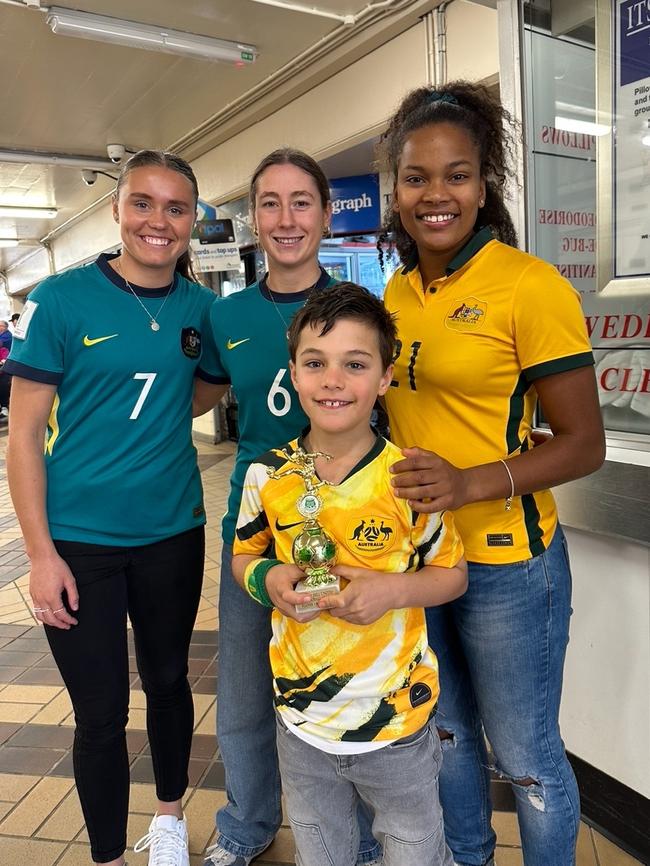
Afterwards, the boys waited eagerly to meet Hunter and her friends, Young Matildas stars Naomi Chinnama and Bryleeh Henry, to show them a poster they had made. Max had his photograph taken with them and told them his parents were taking the boys to one of the FIFA Women’s World Cup 2023 games.
Then the boys got the trio of soccer dynamos to sign their poster, before going home to practise more, inspired by the athleticism of the real live stars they had just met.
And when these girls win as Matildas, Max and Teo will be able to say they met them and talked with them, as they inspire their own football successes.
Originally published as FIFA Women’s World Cup: The Matildas empower the next generation of female players

